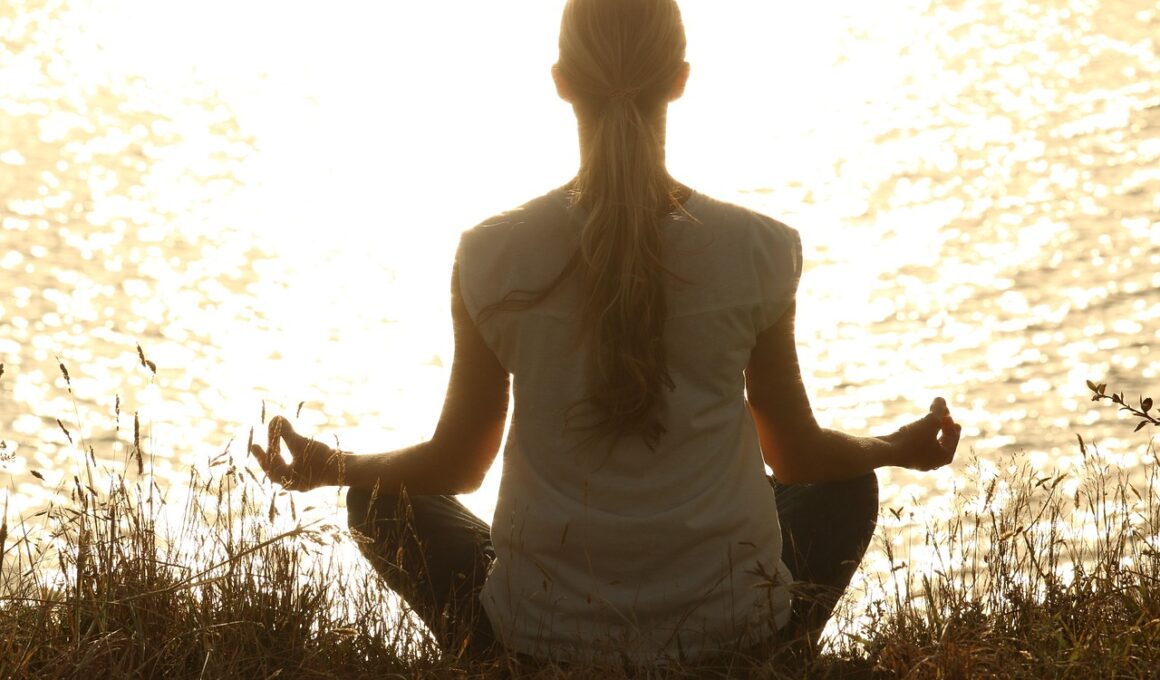Mindful Hydration Practices for Yoga and Meditation
Hydration is crucial, especially for individuals practicing yoga and meditation regularly. It plays a vital role in optimizing physical performance and enhancing mental clarity. One excellent practice is to listen to your body’s signals. Understanding thirst cues can help maintain balance. Drink when the body tells you, but also preemptively hydrate throughout your sessions. Additionally, consider the type of water you consume. Spring water or infused waters can provide additional minerals that enhance the hydration experience. For instance, the presence of electrolytes can aid recovery and sustain energy levels. Infusing water with fresh fruits or herbs such as mint adds delicious flavor and nutrients. Practicing mindful hydration means being aware of every sip taken during yoga or meditation sessions, appreciating the sensation of the water nourishing your body. Another useful tip is incorporating hydration pauses into your routine where you stop to take a few sips consciously. This practice not only rehydrates you but also centers your mind, further connecting your body to your breath. In doing so, hydration can seamlessly become part of your mindful practice. Now let’s explore some effective mindful hydration practices more deeply.
Connecting Breath and Hydration
The connection between breath and hydration is essential in achieving a balanced state during yoga and meditation. When you practice breath control, remember to hydrate accordingly to maintain optimal function. Be aware of how hydration influences your breath; dry throat or dehydration can hinder your respiratory efficiency. A helpful advice is to drink warm water instead of cold. Warm water soothes your muscles and promotes better digestion, which is important for calming the mind during sessions. When engaging in breathwork, take a few sips of water beforehand; it enhances the deep breathing experience by preventing discomfort. Additionally, try to create rituals around hydration as part of your practice routine. For instance, sipping and breathing intentionally while seated in a meditative pose can establish a deeper connection with breath. Consider visualizing water circulating through your body with each deep inhale and exhale. This connection nurtures mindfulness, drawing awareness to your body’s needs. Exploring techniques where breath awareness aligns with hydration cues can cultivate a profound mindful practice that benefits overall serenity. Remember, our bodies are made of water, and nurturing that element can enhance our spiritual journeys.
Utilizing hydration strategies that build awareness within your yoga and meditation routines is paramount. Start with having water visibly accessible during your practices, which serves to remind you to hydrate regularly. Placing a bottle next to your mat can prompt you to sip between poses or even during meditation breaks. Create a habit of checking in with yourself periodically about your hydration needs. Awareness involves tuning into how your body feels and recognizing any signs of dehydration. These might include dry lips, difficulty concentrating, or lack of energy. Rather than consuming excessive water all at once, practice mindful sipping. This approach allows you to gauge your body’s responses more effectively. You might also explore herbal teas as an alternative during colder months. These can provide hydration while also soothing the mind and body. Green tea, for example, has antioxidants that can aid relaxation. Moreover, establishing consistency in your hydration habits can significantly boost your yoga and meditation benefits. Reflection on this practice becomes deeper when you align hydration with the intentions you set during your sessions. Consider journaling your hydration experiences for further growth and understanding.
The Role of Temperature in Hydration
The temperature of the water you consume during yoga and meditation can affect how your body receives hydration. Cold water, while refreshing, can sometimes shock the system, interrupting internal flow and digestion. As mentioned, warm water is often recommended as it is gentler on the body. The warmth assists in promoting better digestion and can improve circulation. Alternately, infused beverages at room temperature can help elevate your hydration experience. Experimenting with different temperatures can help you understand what feels best for your body during practice. You could also try herbal infusions that can soothe, freshen, and hydrate simultaneously. Preparing a thermos of herbal tea before a session can enhance relaxation and warmth, promoting overall comfort. When meditating, consider sipping slowly to maintain awareness of the movements within your body. Tuning into sensations as the water nourishes you fosters mindfulness. Engaging in conversations about hydration temperature with other practitioners can create a shared understanding of best practices. Developing a personal preference for hydration temperature that fits comfortably into your practice will help cultivate deeper mindfulness through awareness of your body.
During physically demanding yoga practices, you might sweat more, so being mindful that increased sweat leads to greater water loss is necessary. Hence, adapting your hydration practices becomes essential. Start by eating hydrating foods before your practice, such as cucumbers, oranges, or watermelon. These fruits contribute significantly to your hydration level while also providing vital nutrients. Combining food and water intake can help replenish your body faster. After completing your yoga or meditation session, replenish lost fluids with small sips rather than large quantities. This mindful approach allows your body to absorb water effectively. Much depends on listening to your body and noting its specific hydration needs post-exertion. As every individual is unique, factors such as age, weight, and activity level can influence hydration requirements significantly. Therefore, taking the time to assess how your body feels and experimenting with various hydration methods will cultivate greater awareness over time. Keeping a water bottle handy or scheduling hydration reminders through your phone can simplify the process. These actions remind you to prioritize hydration alongside your practice.
Mindful Hydration Rituals
Incorporate mindful hydration rituals into your yoga and meditation practices to enhance their depth. Create a pre-meditation or pre-yoga ritual where you take time to drink a glass of water mindfully. Sit comfortably, close your eyes, and take a moment to appreciate the water’s taste, temperature, and the sensation it provides. This small act can shift your mindset into a more receptive state. Additionally, consider infusing rituals with gratitude, speaking positive affirmations while hydrating to set a mindful intention. This could be something as simple as, “I am nourished and whole.” You could also explore using a special glass or bottle dedicated to your practices. Having a unique vessel adds a sense of ceremony to the act of drinking water. Developing a consistent pattern not only fosters mindfulness but can also enhance your physical experience by creating a mental association with hydration and well-being. Reflecting on how these rituals impact your practice encourages evolution. Cultivating mindfulness extends beyond movement or stillness; it does encompass everything we consume—not solely food but water too.
Mindful hydration practices are essential for enriching your yoga and meditation experiences. Ultimately, how we hydrate shapes not only our physical well-being but also inspires a mindful connection to ourselves. It is important to appreciate water and become aware of its profound role in maintaining balance within our bodies. Practice drinking water regularly while integrating deep breathing techniques. Notice the sensations in your body and how hydration correlates with your breath. Consider logging your hydration experiences or participating in discussions within yoga communities to deepen knowledge. This conversation allows sharing techniques to cultivate enriching mindful practices that are valuable for both novices and seasoned practitioners alike. Merely sipping water is far more than a task. It becomes an essential component of your entire meditation experience. As you engage in mindful hydration practices, you’ll likely find an overall enhancement in focus, clarity, and serenity. While you practice, remember that the act of hydration deserves your full attention, forming an essential strand woven through the tapestry of mindful living. This awareness unforgettable complements your journey in yoga and meditation, ensuring that you honor your body’s needs and foster a profound sense of connection.





